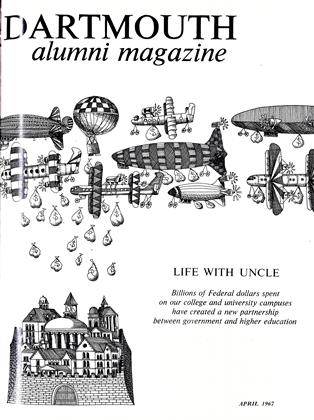STEPHEN P. DORSEY '35, American Consul General in Rome, has the two paradoxical qualities that generate success in the Foreign Service: the ability to stay loose and be tenacious.
His job in Rome as a "sort of mayor" for the 10,000 American residents and host to over half a million American tourists annually calls for ingenuity. The close relationship he is required to maintain with Italian officials calls for strict adherence to diplomacy.
Dorsey began his undergraduate studies bent on architecture. But architects, the practical Dorsey realized, need clients and there were few in the post-Depression years. So he switched to history and economics.
In 1940, after collecting an M.B.A. at Harvard, he was working with the First Boston Corporation when President Ernest Martin Hopkins, who had gone to Washington as a top official in the Office of Production Management, called and asked him to be his personal assistant.
Dorsey asked Hoppy when he wanted him, suggesting "In about a month?" Hoppy replied: "What about tomorrow?" They settled on two weeks. At his wife's urging they took all their furnishings to Washington "just in case" and, except for the year he spent back in business, Dorsey has been involved in government work since.
His willingness to be flexible and his concentration on, and consequent success with, each job at hand brought him through a series of more responsible positions, to the State Department in 1944, and to the Foreign Service in 1955. Previous diplomatic assignments include Bierut in Lebanon and Khartoum in the Sudan. He is considered a State Department expert on that area. His most recent assignment before Rome was as Consul General in Genoa.
He describes his present job as "largely one of administration and human relations" and contrasts it to Khartoum where as Deputy Chief of Mission he was respon- sible to the Ambassador for the overall operation of the Embassy and its large constituent economic aid Mission. "This was extremely interesting from a political point of view," he says, "for next door the Congo was at the height of its first political troubles."
Of his job in Rome, he says: "We deal daily with a variety of problems which range from taking charge of the affairs and making funeral arrangements for a deceased citizen to assisting physically or mentally ill or destitute Americans, and finding missing persons."
Throughout his varied career Dorsey has pursued many hobbies, some initiated by his new surroundings - collecting ancient silver coins and religious icons; some a result of his lifelong interest in history and architecture - collecting and refurbishing antiques, building models of early sailing vessels, and most notable, writing three books on architecture: Early English Churches in America, Alexandria Houses, 1750-1830, and Georgetown Houses ofthe Federal Period. These were in part visual essays because photography is another one of his hobbies. As is bird shooting, and Sunday painting, and - one he discovered in recent years in Switzerland - curling.
As Consul General in Rome, Dorsey is also Counselor for Consular Affairs. He is responsible for supervising and coordinating the seven other consular posts in Italy which he tries to visit at least twice a year. But he also travels for pleasure as much as possible, writing and photographing. He hopes some of this "will add up to a book on architectural monuments of the Eastern Mediterranean."
 View Full Issue
View Full Issue
More From This Issue
-
 Feature
FeatureLife with Uncle
April 1967 -
 Feature
FeatureDICK'S HOUSE
April 1967 -
 Feature
FeatureUNCLE SAM AT DARTMOUTH
April 1967 By C. E. W. -
 Article
ArticleThe Undergraduate Chair
April 1967 By ART HAUPT '67 -
 Article
ArticleEloquence at Gettysburg and Daniel Webster
April 1967 By EARL W. WILEY '08 -
 Class Notes
Class Notes1920
April 1967 By MACOMBER, JOHN s. MAYER







